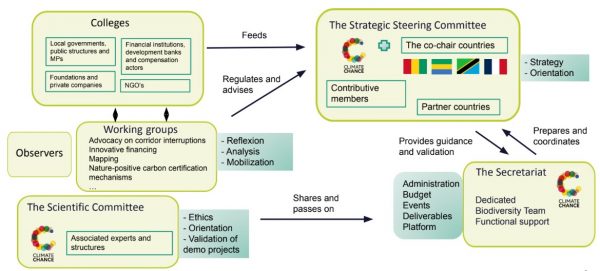Since the launch of the International Coalition on Biodiversity Corridors in Africa, Climate Chance, as the coalition’s secretary, has first sought to identify the key players in this field. Thus, for the launch of the coalition at COP15 Biodiversity in Montreal, we mobilized and brought together a wide range of players, thereby underlining the existing momentum around this issue.
Today, the Coalition is structured around fluid governance, based on expertise, sharing and consensus.
- The Strategic Steering Committee
Co-chaired by France, Guinea, Tanzania and Gabon, the Strategic Orientation Committee defines the Coalition’s major orientations. It plays a strategic role in determining the Coalition’s roadmap and strategic orientations, and builds a shared vision of the Coalition’s challenges. It is made up of partner countries, funders and working group representatives.
- The Scientific Committee
The members of the Scientific Committee offer their expertise as members of the International Coalition African Biodiversity Corridors. It is made up of independent personalities responsible for guaranteeing the scientific rigor of the process (data put online, production of documents and analysis tools: mapping, studies). It validates the recommendations made by the members of the specific working groups
- Working groups
The Coalition’s technical partners are members of these groups. Other reference structures may also join. They are dedicated to defining a common methodology and approach to ecological connectivity issues, defined according to the Coalition’s main themes, and to identifying concrete commitments to monitor their implementation.
-Mapping Working Group
The “Mapping” working group is responsible for defining migration routes and major connectivity corridors in Africa, following a well-defined data collection methodology. It identifies key areas of concern, including the identification of projects requiring funding.
-Innovative financing and compensation mechanisms working group
The “Innovative Financing” working group explores various financing solutions for projects aimed at promoting ecological connectivity, by centralizing existing opportunities and highlighting alternatives to traditional financing models for project leaders.
-Advocacy and Governance working group
The “Advocacy and Governance” working group provides an overview of ecological connectivity and its integration into political and legal systems in Africa. To do this, it focuses on two major topics:
– Human-wildlife conflicts;
– Corridor disruptions.
- The secretariat
The Coalition’s secretariat is responsible for leading the Coalition, coordinating and ensuring the coherence of its activities and operations. It ensures compliance with the key principles of the Coalition’s governance and strategy. It communicates collegially on its working documents (action plans, work programs, etc.). Its role is to ensure the transparency of both the Coalition’s activities and the data exchanged between its members. To this end, it has a dedicated team, of which the Observatoire Climate Chance Afrique is also a member.
It monitors scientific publications, current research and, more generally, the projects carried out by Coalition members. The Climate Chance association strengthens the dynamics of the Coalition and encourages dialogue between all stakeholders.


